Deck 1: Limits and Their Properties
Question
Question
Question
Question
Question
Question
Question
Question
Question
Question
Question
Question
Question
Question
Question
Question
Question
Question
Question
Question
Question
Question
Question
Question
Question
Question
Question
Question
Question
Question

Unlock Deck
Sign up to unlock the cards in this deck!
Unlock Deck
Unlock Deck
1/30
Play
Full screen (f)
Deck 1: Limits and Their Properties
1
Complete the table and use the result to estimate the limit. 
A)-0.062500
B)0.067500
C)-0.192500
D)0.047500
E)-0.172500

A)-0.062500
B)0.067500
C)-0.192500
D)0.047500
E)-0.172500
-0.062500
2
Decide whether the following problem can be solved using precalculus, or whether calculus is required.If the problem can be solved using precalculus, solve it.If the problem seems to
Require calculus, use a graphical or numerical approach to estimate the solution.
Find the distance traveled in 20 seconds by an object moving with a velocity of feet
feet
Per second.
A)calculus, 162.4485 ft
B)precalculus, 163.7985 ft
C)calculus, 165.4777 ft
D)precalculus, 165.4777 ft
E)precalculus, 162.4485 ft
Require calculus, use a graphical or numerical approach to estimate the solution.
Find the distance traveled in 20 seconds by an object moving with a velocity of
 feet
feetPer second.
A)calculus, 162.4485 ft
B)precalculus, 163.7985 ft
C)calculus, 165.4777 ft
D)precalculus, 165.4777 ft
E)precalculus, 162.4485 ft
calculus, 165.4777 ft
3
Let  Determine the following limit.(Hint: Use the graph to calculate the limit.)
Determine the following limit.(Hint: Use the graph to calculate the limit.) 
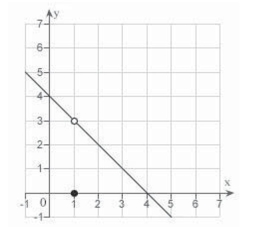
A)5
B)4
C)3
D)0
E)does not exist
 Determine the following limit.(Hint: Use the graph to calculate the limit.)
Determine the following limit.(Hint: Use the graph to calculate the limit.) 

A)5
B)4
C)3
D)0
E)does not exist
3
4
Consider the function  and the point
and the point  on the graph of
on the graph of
A)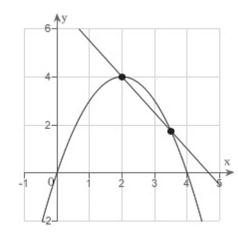
B)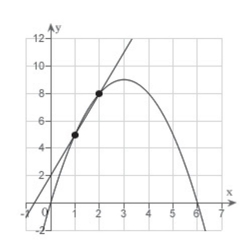
C)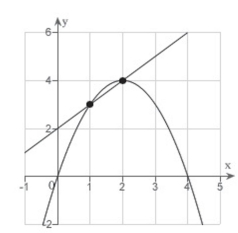
D)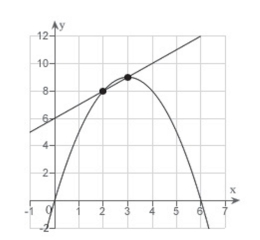
E)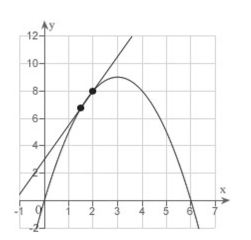
 and the point
and the point  on the graph of
on the graph ofA)

B)

C)

D)

E)


Unlock Deck
Unlock for access to all 30 flashcards in this deck.
Unlock Deck
k this deck
5
Complete the table and use the result to estimate the limit. 
A)0.525000
B)0.275000
C)-0.100000
D)0.400000
E)-0.475000

A)0.525000
B)0.275000
C)-0.100000
D)0.400000
E)-0.475000

Unlock Deck
Unlock for access to all 30 flashcards in this deck.
Unlock Deck
k this deck
6
Complete the table and use the result to estimate the limit. 
A)
B)
C)0
D)0.5

A)

B)

C)0
D)0.5


Unlock Deck
Unlock for access to all 30 flashcards in this deck.
Unlock Deck
k this deck
7
Use the rectangles in the graph given below to approximate the area of the region bounded by  Round your answer to three decimal places.
Round your answer to three decimal places. 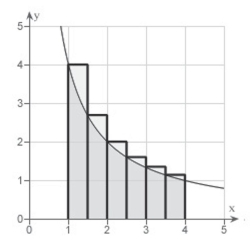
A)2.481
B)6.371
C)3.585
D)6.872
E)6.903
 Round your answer to three decimal places.
Round your answer to three decimal places. 
A)2.481

B)6.371

C)3.585

D)6.872

E)6.903


Unlock Deck
Unlock for access to all 30 flashcards in this deck.
Unlock Deck
k this deck
8
Decide whether the following problem can be solved using precalculus, or whether calculus is required.If the problem can be solved using precalculus, solve it.If the problem seems to
Require calculus, use a graphical or numerical approach to estimate the solution.
A cyclist is riding on a path whose elevation is modeled by the function where
where  are measured in miles.Find the rate of change of elevation when x = 4.
are measured in miles.Find the rate of change of elevation when x = 4. 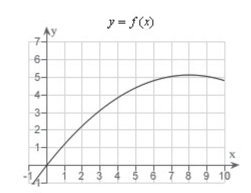
A)precalculus, 0.08
B)calculus, 0.2
C)calculus, 0.64
D)calculus, 0.08
E)precalculus, 0.2
Require calculus, use a graphical or numerical approach to estimate the solution.
A cyclist is riding on a path whose elevation is modeled by the function
 where
where  are measured in miles.Find the rate of change of elevation when x = 4.
are measured in miles.Find the rate of change of elevation when x = 4. 
A)precalculus, 0.08
B)calculus, 0.2
C)calculus, 0.64
D)calculus, 0.08
E)precalculus, 0.2

Unlock Deck
Unlock for access to all 30 flashcards in this deck.
Unlock Deck
k this deck
9
Decide whether the following problem can be solved using precalculus, or whether calculus is required.If the problem can be solved using precalculus, solve it.If the problem seems to
Require calculus, use a graphical or numerical approach to estimate the solution.
Find the area of the shaded region bounded by the triangle with vertices (0,0), (8,9), (17,0).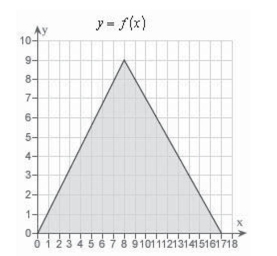
A)precalculus , 153
B)calculus , 229.5
C)precalculus , 76.5
D)precalculus , 229.5
E)calculus , 153
Require calculus, use a graphical or numerical approach to estimate the solution.
Find the area of the shaded region bounded by the triangle with vertices (0,0), (8,9), (17,0).

A)precalculus , 153
B)calculus , 229.5
C)precalculus , 76.5
D)precalculus , 229.5
E)calculus , 153

Unlock Deck
Unlock for access to all 30 flashcards in this deck.
Unlock Deck
k this deck
10
Determine the following limit.(Hint: Use the graph to calculate the limit.) 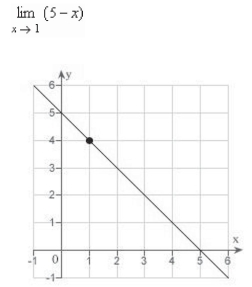
A)6
B)1
C)5
D)4
E)does not exist

A)6
B)1
C)5
D)4
E)does not exist

Unlock Deck
Unlock for access to all 30 flashcards in this deck.
Unlock Deck
k this deck
11
Consider the function  and the point
and the point  on the graph of
on the graph of
A)m=0.1667
B)m=0.0832
C)m=0.3800
D)m=0.0556
E)m=0.0833
 and the point
and the point  on the graph of
on the graph ofA)m=0.1667
B)m=0.0832
C)m=0.3800
D)m=0.0556
E)m=0.0833

Unlock Deck
Unlock for access to all 30 flashcards in this deck.
Unlock Deck
k this deck
12
on the graph of f. Find the
slope of the secant line passing through and for . Round your answer to
four decimal places.
Consider the function nd the point
nd the point  on the graph of f. Find the slope of the secant line passing through
on the graph of f. Find the slope of the secant line passing through  Round your answer to four decimal places.
Round your answer to four decimal places.
A)m=0.1000
B)m=0.0122
C)m=0.01220
D)m=0.3133
slope of the secant line passing through and for . Round your answer to
four decimal places.
Consider the function
 nd the point
nd the point  on the graph of f. Find the slope of the secant line passing through
on the graph of f. Find the slope of the secant line passing through  Round your answer to four decimal places.
Round your answer to four decimal places. A)m=0.1000
B)m=0.0122
C)m=0.01220
D)m=0.3133

Unlock Deck
Unlock for access to all 30 flashcards in this deck.
Unlock Deck
k this deck
13
Decide whether the following problem can be solved using precalculus, or whether calculus is required.If the problem can be solved using precalculus, solve it.If the problem seems to
Require calculus, use a graphical or numerical approach to estimate the solution.
A cyclist is riding on a path whose elevation is modeled by the function where x and
where x and  are measured in miles.Find the rate of change of elevation when x = 5.
are measured in miles.Find the rate of change of elevation when x = 5. 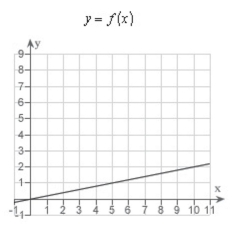
A)calculus, 2
B)precalculus, 0.2
C)calculus, 0.2
D)precalculus, 2
E)precalculus, 0.45
Require calculus, use a graphical or numerical approach to estimate the solution.
A cyclist is riding on a path whose elevation is modeled by the function
 where x and
where x and  are measured in miles.Find the rate of change of elevation when x = 5.
are measured in miles.Find the rate of change of elevation when x = 5. 
A)calculus, 2
B)precalculus, 0.2
C)calculus, 0.2
D)precalculus, 2
E)precalculus, 0.45

Unlock Deck
Unlock for access to all 30 flashcards in this deck.
Unlock Deck
k this deck
14
Consider the function  and the point
and the point  on the graph of
on the graph of
A)10
B)3
C)8
D)2
E)9
 and the point
and the point  on the graph of
on the graph ofA)10
B)3
C)8
D)2
E)9

Unlock Deck
Unlock for access to all 30 flashcards in this deck.
Unlock Deck
k this deck
15
Consider the function  and the point
and the point  n the graph of
n the graph of
A)3.5
B)2.0
C)3.0
D)4.5
E)9.0
 and the point
and the point  n the graph of
n the graph ofA)3.5
B)2.0
C)3.0
D)4.5
E)9.0

Unlock Deck
Unlock for access to all 30 flashcards in this deck.
Unlock Deck
k this deck
16
Consider the function  and the point
and the point  on the graph of
on the graph of
A)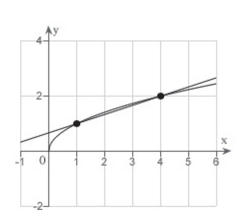
B)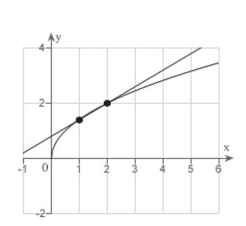
C)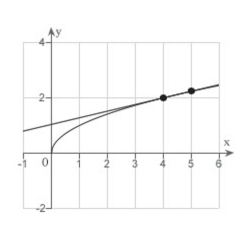
D)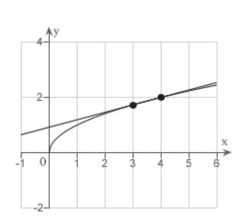
E)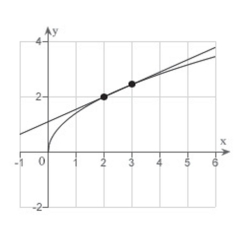
 and the point
and the point  on the graph of
on the graph ofA)

B)

C)

D)

E)


Unlock Deck
Unlock for access to all 30 flashcards in this deck.
Unlock Deck
k this deck
17
Decide whether the following problem can be solved using precalculus, or whether calculus is required.If the problem can be solved using precalculus, solve it.If the problem seems to
Require calculus, use a graphical or numerical approach to estimate the solution.
Find the distance traveled in 16 seconds by an object traveling at a constant velocity of 20 feet per
Second.
A)calculus, 320 ft
B)calculus, 340 ft
C)precalculus, 320 ft
D)calculus, 640 ft
E)precalculus, 640 ft
Require calculus, use a graphical or numerical approach to estimate the solution.
Find the distance traveled in 16 seconds by an object traveling at a constant velocity of 20 feet per
Second.
A)calculus, 320 ft
B)calculus, 340 ft
C)precalculus, 320 ft
D)calculus, 640 ft
E)precalculus, 640 ft

Unlock Deck
Unlock for access to all 30 flashcards in this deck.
Unlock Deck
k this deck
18
Decide whether the following problem can be solved using precalculus, or whether calculus is required.If the problem can be solved using precalculus, solve it.If the problem seems to
Require calculus, use a graphical or numerical approach to estimate the solution.
Find the area of the shaded region.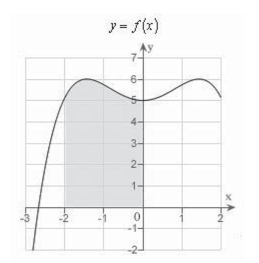
A)calculus , 11
B)precalculus , 11
C)precalculus , 13
D)calculus , 16
E)precalculus , 16
Require calculus, use a graphical or numerical approach to estimate the solution.
Find the area of the shaded region.

A)calculus , 11
B)precalculus , 11
C)precalculus , 13
D)calculus , 16
E)precalculus , 16

Unlock Deck
Unlock for access to all 30 flashcards in this deck.
Unlock Deck
k this deck
19
Consider the function  and the point P(64,8) on the graph of
and the point P(64,8) on the graph of
A)0.0633 , -0.0627 , 0.0623
B)0.0633 , 0.0627 , 0.0623
C)0.0317 , 0.0314 , 0.0312
D)0.0633 , -0.0627 , -0.0623
E)-0.0317 , -0.0314 , -0.0312
 and the point P(64,8) on the graph of
and the point P(64,8) on the graph ofA)0.0633 , -0.0627 , 0.0623
B)0.0633 , 0.0627 , 0.0623
C)0.0317 , 0.0314 , 0.0312
D)0.0633 , -0.0627 , -0.0623
E)-0.0317 , -0.0314 , -0.0312

Unlock Deck
Unlock for access to all 30 flashcards in this deck.
Unlock Deck
k this deck
20
Consider the length of the graph of  Approximate the length of the curve by finding the sum of the lengths of four line segments, as shown in following
Approximate the length of the curve by finding the sum of the lengths of four line segments, as shown in following
Figure.Round your answer to two decimal places.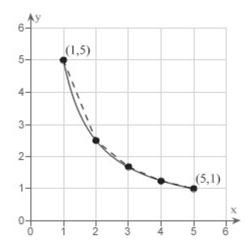
A)6.11
B)8.12
C)5.66
D)8.49
E)7.11
 Approximate the length of the curve by finding the sum of the lengths of four line segments, as shown in following
Approximate the length of the curve by finding the sum of the lengths of four line segments, as shown in followingFigure.Round your answer to two decimal places.

A)6.11
B)8.12
C)5.66
D)8.49
E)7.11

Unlock Deck
Unlock for access to all 30 flashcards in this deck.
Unlock Deck
k this deck
21
What is the limit of  as x approaches
as x approaches 
A)
B)
C)
D)
E)none of the above
 as x approaches
as x approaches 
A)

B)

C)

D)

E)none of the above

Unlock Deck
Unlock for access to all 30 flashcards in this deck.
Unlock Deck
k this deck
22
Let  Determine the following limit.(Hint: Use the graph to calculate the limit.)
Determine the following limit.(Hint: Use the graph to calculate the limit.) 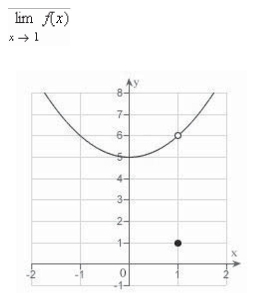
A)6
B)25
C)1
D)5
E)does not exist.
 Determine the following limit.(Hint: Use the graph to calculate the limit.)
Determine the following limit.(Hint: Use the graph to calculate the limit.) 
A)6
B)25
C)1
D)5
E)does not exist.

Unlock Deck
Unlock for access to all 30 flashcards in this deck.
Unlock Deck
k this deck
23
Find the limit L. 
A)L = 9
B)L = 2
C)L = 7
D)L = 16
E)none of the above

A)L = 9
B)L = 2
C)L = 7
D)L = 16
E)none of the above

Unlock Deck
Unlock for access to all 30 flashcards in this deck.
Unlock Deck
k this deck
24
The graph of  is shown in the figure.Find
is shown in the figure.Find  such that if
such that if  then
then 
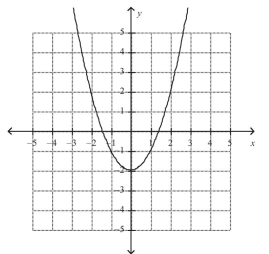
A)
B)
C)
D)
E)None of the above
 is shown in the figure.Find
is shown in the figure.Find  such that if
such that if  then
then 

A)

B)

C)

D)

E)None of the above

Unlock Deck
Unlock for access to all 30 flashcards in this deck.
Unlock Deck
k this deck
25
A ring has a inner circumference of 10 centimeters.What is the radius of the ring? Round your answer to four decimal places.
A)0.7958 centimeter
B)3.1831 centimeters
C)1.5915 centimeters
D)1.7841 centimeters
E)10.1321 centimeters
A)0.7958 centimeter
B)3.1831 centimeters
C)1.5915 centimeters
D)1.7841 centimeters
E)10.1321 centimeters

Unlock Deck
Unlock for access to all 30 flashcards in this deck.
Unlock Deck
k this deck
26
A sphere has a volume of 4.76 cubic inches.What is the radius of the sphere? Round your answer to four decimal places.
A)1.0435 inches
B)1.6565 inches
C)1.0660 inches
D)2.1320 inches
E)1.9335 inches
A)1.0435 inches
B)1.6565 inches
C)1.0660 inches
D)2.1320 inches
E)1.9335 inches

Unlock Deck
Unlock for access to all 30 flashcards in this deck.
Unlock Deck
k this deck
27
Find the limit L. 
A)L = 12
B)L = 6
C)L = 2
D)L = -4
E)none of the above

A)L = 12
B)L = 6
C)L = 2
D)L = -4
E)none of the above

Unlock Deck
Unlock for access to all 30 flashcards in this deck.
Unlock Deck
k this deck
28
A sphere has a volume of 4.44 cubic inches.If the sphere's volume can vary between 3.64 cubic inches and 5.04 cubic inches , how can the radius vary? Round your answer to five
Decimal places.
A)Radius can vary between 0.93219 inch and 1.09691 inches.
B)Radius can vary between 0.21960 inch and 1.61960 inches.
C)Radius can vary between 1.69081 inches and 1.98957 inches.
D)Radius can vary between 1.51481 inches and 1.68837 inches.
E)Radius can vary between 0.95427 inch and 1.06361 inches.
Decimal places.
A)Radius can vary between 0.93219 inch and 1.09691 inches.
B)Radius can vary between 0.21960 inch and 1.61960 inches.
C)Radius can vary between 1.69081 inches and 1.98957 inches.
D)Radius can vary between 1.51481 inches and 1.68837 inches.
E)Radius can vary between 0.95427 inch and 1.06361 inches.

Unlock Deck
Unlock for access to all 30 flashcards in this deck.
Unlock Deck
k this deck
29
A ring has a inner circumference of 9 centimeters.If the ring's inner circumference can vary between 8 centimeters and 10 centimeters how can the radius vary? Round your answer to
Five decimal places.
A)Radius can vary between 6.48456 centimeters and 10.13212 centimeters.
B)Radius can vary between 1.59577 centimeters and 1.78412 centimeters.
C)Radius can vary between 1.27324 centimeters and 1.59155 centimeters.
D)Radius can vary between 2.54648 centimeters and 3.18310 centimeters.
E)Radius can vary between 0.43239 centimeter and 2.43239 centimeters.
Five decimal places.
A)Radius can vary between 6.48456 centimeters and 10.13212 centimeters.
B)Radius can vary between 1.59577 centimeters and 1.78412 centimeters.
C)Radius can vary between 1.27324 centimeters and 1.59155 centimeters.
D)Radius can vary between 2.54648 centimeters and 3.18310 centimeters.
E)Radius can vary between 0.43239 centimeter and 2.43239 centimeters.

Unlock Deck
Unlock for access to all 30 flashcards in this deck.
Unlock Deck
k this deck
30
Determine the following limit.(Hint: Use the graph to calculate the limit.) 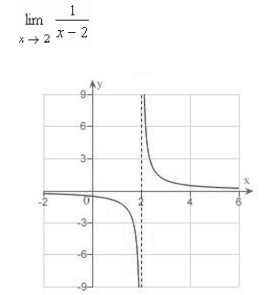
A)-2
B)0
C)-4
D)2
E)does not exist

A)-2
B)0
C)-4
D)2
E)does not exist

Unlock Deck
Unlock for access to all 30 flashcards in this deck.
Unlock Deck
k this deck



